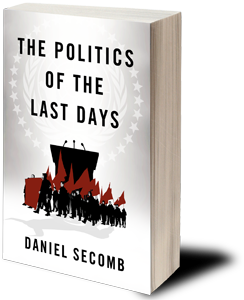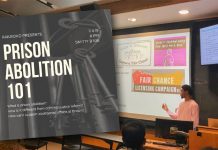Lone Conservative’s Peter D’Abrosca compiled a list of eleven “asinine and downright perplexing” courses offered at varying universities and colleges in the upcoming academic semester.
The selected courses all feature neo-Marxist allusions to “intersectionality”; the ranking of assorted arbitrarily-defined groups — usually racial, ethnic, and sexual — into hierarchies of oppressed status.
Observers should note that Ivy League universities such as Harvard, Princeton, Stanford and others — as well as many other universities and colleges — enjoy tax-free status as 501(c)(3) non-profit organizations.
See them below.
1. Oberlin College —How to Win a Beauty Pageant: Race, Gender, Culture, & U.S. National Identity
“This course examines US beauty pageants from the 1920s to the present. Our aim will be to analyze pageantry as a unique site for the interplay of race, gender, class, sexuality, and nation. We will learn about cultural studies methodology, including close reading, cultural history, critical discourse analysis, and ethnography, and use those methods to understand the changing identity of the US over time. This course includes a field visit to a pageant in Ohio.”
2. Rhode Island School of Design (RISD) —Transracial Bodies, Transracial Selves
“Technological advances in surgery, hormonal therapy, psychiatry, [and] cultural warfare are catching up to the transgender presence: the gendered body is not necessarily that with which we were born, but one that can be crafted to match the real body of our psyche, our dreams. Blackness, Whiteness, Asianness, Latinness, the whole rainbow of racial identification, is still construed as biologically inescapable and inevitable. the often negative reaction to transracialism is contrary to the everyday experience that actually finds racial identification as a process that is always transracial. Declaring ourselves racially, we all cross restricted zones in becoming ourselves. In this course, we will use the discourse of transgenderism to build an alternate vocabulary of race.”
3. Stanford University —Love as a Force for Social Justice
“This course will explore the concept of agape love (compassion/kindness) as a force for social justice and action and as the inspiration for service and the application of knowledge to positive social change. Biological, psychological, religious, and social perspectives of love will be discussed, drawing on the expertise of people from a variety of disciplines.”
4. UCLA —Queering American History
“History of sexual and gender minorities in U.S. Topics include changing norms, romantic friendships, medical discourse, liberation politics, post-Stonewall culture, AIDS, transgender movement, queer theory, and politics.”
5. Swarthmore College —Sex, Gender, and the Bible
“The first two chapters of the biblical book of Genesis offer two very different ancient accounts of the creation of humanity and the construction of gender. The rest of the book of Genesis offers a unique portrayal of family dynamics, drama and dysfunction, full of complex and compelling narratives where gender is constantly negotiated and renegotiated. In this class, we will engage in close readings of primary biblical sources and contemporary feminist and queer scholarship about these texts, as we explore what the first book of the Bible says about God, gender, power, sexuality, and family values.”
6. Brown University —Feminist Theory for a Heated Planet
“The ecological crises – the “sixth extinction,” “global warming,” “the eruption of Gaia” – have forced many humans to challenge contingent boundaries drawn in more or less compelling ways in the Western world. Dualisms opposing nature to culture, the human and the nonhuman, the natural and the technological, the feminine and the masculine, seem more destabilized than ever. When geologists came up with a new epoch called the “Anthropocene,” feminist theory was well equipped to problematize this allegedly omnipotent “anthropos.” Reciprocally, queer, post-colonial, and feminist theories have re-thought the never so normative, hardly stable, greatly unknown, nature of nature.”
7. University of Chicago —Gendering Privacy
“Interest in privacy has surged in recent decades in light of the emergence of Big Data, the rise of increasingly sophisticated methods of surveillance, and the ubiquity of networked social media in everyday life. Yet privacy remains a notoriously slippery concept to pin down—across disciplines, privacy has been conceptualized variously as a legal right, a psychological state of being, a set of preferences, and a boundary-making process. In this course, we take a sociological approach to privacy, starting with the notion that privacy is at once a decidedly “micro” individual phenomenon and at the same time a product of “macro” social-structural forces. Thus, while privacy preferences can vary from person to person, the capacity to achieve privacy is shaped by social position (e.g., race, class, gender, etc.). In this course, we focus specifically on how women and men experience possibilities for privacy and how these experiences are shaped by their racial and class location. We will draw on a range of theoretical perspectives, including feminist theory, critical legal theory, and critical race theory to examine privacy through the lens of social inequality. Empirically, we will investigate how the twin systems of welfare and criminal justice present challenges to privacy for men and women living in poverty. The main questions guiding our inquiry include: Who gets to have privacy (and who doesn’t), why, and at what costs?”
Columbia University —Sex, Aesthetics & Capitalism
“How can performances, theatrical texts, and other art/media objects illuminate the operations of gender, sexuality, and race in global capitalism? Drawing from a range of artistic media and critical traditions, we explore how aesthetic thought can help us analyze the sexual, racial, and national character of contemporary labor and life.”
Swarthmore College —Queering God
“The God of the Bible and later Jewish and Christian literature is distinctively masculine, definitely male. Or is He? If we can point out places in traditional writings where God is nurturing, forgiving, and loving, does that mean that God is feminine, or female? This course examines feminist and queer writings about God, explores the tensions between feminist and queer theology, and seeks to stretch the limits of gendering-and sexing-the divine. Key themes include: gender; embodiment; masculinity; liberation; sexuality; feminist and queer theory.”
UC-Santa Barbara —Feminist Theories of Science and Feminist Scientists
“Exploration of feminists analyses and critiques of science in social, historical, and political contexts. How does science construct gender? How and why are women excluded from scientific discourses and practices? How have women transformed science, and what is “feminist science?”
Princeton University —Trumpland
“We will examine conspiracy theory, rural atomization, truth claims, and racial identity politics in light of ‘Trump-ist’ politics, and seek to chart its path forward in an increasingly destabilized political terrain,” [we] will introduce students to critical theory on race (especially whiteness), conspiracy, authoritarianism, and democracy. [We will also explore] America’s deindustrialization, white identity politics, nationalism, populism, and a new ‘post-truth’ relationship with the media.”
Source: The Daily Wire
 Register your interest for Daniel Secomb's new book, "Politics of the Last Days"
Register your interest for Daniel Secomb's new book, "Politics of the Last Days"
Daniel's new book explores the integral and fascinating role that politics will play in the end times.
He demonstrates that political philosophy is actually underpinned by biblcal principles and that by examining the political history of the past can give us a fascinating glimpse into how Biblical end times events will unfold.
Be sure to sign up with your name and email address to be notified of updates and the upcoming release date of the book.


















